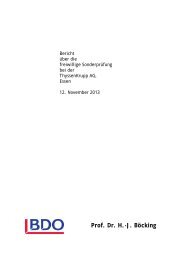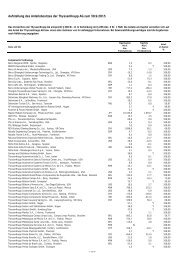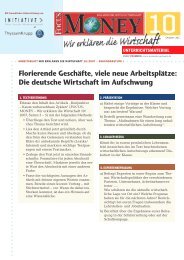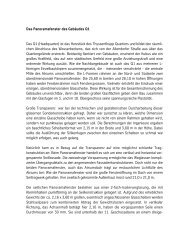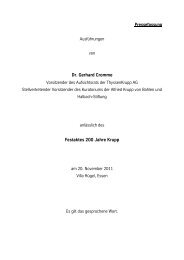- Page 1:
Annual Report 2010/2011 At the cent
- Page 4 and 5:
Our mission statement We are Thysse
- Page 6 and 7:
Our capabilities Material We combin
- Page 8 and 9:
Making tomorrow possible Our engine
- Page 10 and 11: Letter to shareholders Dr.-Ing. Hei
- Page 12 and 13: Letter to shareholders To assist ou
- Page 14 and 15: Contents Our mission statement C2 F
- Page 17 and 18: To our shareholders To our sharehol
- Page 19 and 20: Solutions for many sectors In the f
- Page 21 and 22: To our shareholders 1.1 To our shar
- Page 23 and 24: To our shareholders Edwin Eichler a
- Page 25 and 26: To our shareholders Wilhelm Segerat
- Page 27 and 28: To our shareholders 1.2 To our shar
- Page 29 and 30: To our shareholders 1.2 To our shar
- Page 31 and 32: To our shareholders 1.2 To our shar
- Page 33 and 34: To our shareholders 1.3 To our shar
- Page 35 and 36: To our shareholders 1.3 To our shar
- Page 37 and 38: To our shareholders 1.3 To our shar
- Page 39 and 40: To our shareholders 1.3 To our shar
- Page 41 and 42: To our shareholders 1.3 To our shar
- Page 43 and 44: To our shareholders 1.3 To our shar
- Page 45 and 46: To our shareholders 1.4 1.4 To To o
- Page 47 and 48: To our shareholders 1.4 To our shar
- Page 49 and 50: Management report on the Group Mana
- Page 51 and 52: Lightening the load The challenge o
- Page 53 and 54: Management report on the Group 2.1
- Page 55 and 56: IPO: Sale of a company to investors
- Page 57 and 58: Management report on the Group 2.1
- Page 59: Management report on the Group 2.1
- Page 63 and 64: Management report on the Group 2.2
- Page 65 and 66: Management report on the Group 2.2
- Page 67 and 68: Management report on the Group 2.2
- Page 69 and 70: Management report on the Group 2.2
- Page 71 and 72: Management report on the Group 2.2
- Page 73 and 74: Management report on the Group 2.2
- Page 75 and 76: Management report on the Group 2.3
- Page 77 and 78: Management report on the Group 2.3
- Page 79 and 80: Management report on the Group 2.3
- Page 81 and 82: Management report on the Group 2.3
- Page 83 and 84: Management report on the Group 2.3
- Page 85 and 86: Management report on the Group 2.3
- Page 87 and 88: Management report on the Group 2.3
- Page 89 and 90: Management report on the Group 2.4
- Page 91 and 92: Management report on the Group 2.4
- Page 93 and 94: Management report on the Group 2.4
- Page 95 and 96: Management report on the Group 2.4
- Page 97 and 98: Management report on the Group 2.5
- Page 99 and 100: Management report on the Group 2.5
- Page 101 and 102: Management report on the Group 2.5
- Page 103 and 104: Management report on the Group 2.5
- Page 105 and 106: Management report on the Group 2.5/
- Page 107 and 108: Management report on the Group 2.7
- Page 109 and 110: Management report on the Group 2.7
- Page 111 and 112:
Management report on the Group 2.7
- Page 113 and 114:
Management report on the Group 2.7
- Page 115 and 116:
Management report on the Group 2.7
- Page 117 and 118:
Management report on the Group 2.7
- Page 119 and 120:
Management report on the Group 2.7
- Page 121 and 122:
Management report on the Group 2.7
- Page 123 and 124:
Management report on the Group 2.7
- Page 125 and 126:
Management report on the Group 2.8
- Page 127 and 128:
Management report on the Group 2.8
- Page 129 and 130:
Consolidated fi nancial statements
- Page 131 and 132:
Using space better The challenge of
- Page 133 and 134:
3.1 Consolidated financial statemen
- Page 135 and 136:
Consolidated financial statements 3
- Page 137 and 138:
Consolidated financial statements 3
- Page 139 and 140:
3.6 Consolidated financial statemen
- Page 141 and 142:
3.6 Consolidated financial statemen
- Page 143 and 144:
3.6 Consolidated financial statemen
- Page 145 and 146:
3.6 Consolidated financial statemen
- Page 147 and 148:
3.6 Consolidated financial statemen
- Page 149 and 150:
3.6 Consolidated financial statemen
- Page 151 and 152:
3.6 Consolidated financial statemen
- Page 153 and 154:
3.6 Consolidated financial statemen
- Page 155 and 156:
3.6 Consolidated financial statemen
- Page 157 and 158:
3.6 Consolidated financial statemen
- Page 159 and 160:
3.6 Consolidated financial statemen
- Page 161 and 162:
3.6 Consolidated financial statemen
- Page 163 and 164:
3.6 Consolidated financial statemen
- Page 165 and 166:
3.6 Consolidated financial statemen
- Page 167 and 168:
3.6 Consolidated financial statemen
- Page 169 and 170:
3.6 Consolidated financial statemen
- Page 171 and 172:
3.6 Consolidated financial statemen
- Page 173 and 174:
3.6 Consolidated financial statemen
- Page 175 and 176:
3.6 Consolidated financial statemen
- Page 177 and 178:
Consolidated financial statements A
- Page 179 and 180:
Guarantees include contingent liabi
- Page 181 and 182:
22 Financial instruments Consolidat
- Page 183 and 184:
Interest rate swaps and cross curre
- Page 185 and 186:
3.6 Consolidated financial statemen
- Page 187 and 188:
Consolidated financial statements T
- Page 189 and 190:
3.6 Consolidated financial statemen
- Page 191 and 192:
3.6 Consolidated financial statemen
- Page 193 and 194:
million € For the fiscal year end
- Page 195 and 196:
The reconciliations of sales, incom
- Page 197 and 198:
3.6 Consolidated financial statemen
- Page 199 and 200:
3.6 Consolidated financial statemen
- Page 201 and 202:
3.6 Consolidated financial statemen
- Page 203 and 204:
3.6 Consolidated financial statemen
- Page 205 and 206:
3.6 Consolidated financial statemen
- Page 207 and 208:
Fully consolidated group companies
- Page 209 and 210:
Fully consolidated group companies
- Page 211 and 212:
Fully consolidated group companies
- Page 213 and 214:
Fully consolidated group companies
- Page 215 and 216:
Fully consolidated group companies
- Page 217 and 218:
Fully consolidated group companies
- Page 219 and 220:
Fully consolidated group companies
- Page 221 and 222:
Fully consolidated group companies
- Page 223 and 224:
Equity-stated companies (*=Joint Ve
- Page 225 and 226:
Other associated affiliates (*=Join
- Page 227 and 228:
Auditors’ Auditor’ report Repor
- Page 229 and 230:
Additional information How have Thy
- Page 231 and 232:
Making things more effi ciently The
- Page 233 and 234:
4.1 Additional information Multi-ye
- Page 235 and 236:
4.2 Additional information Other di
- Page 237 and 238:
4.3 Additional information Other di
- Page 239 and 240:
4.5 Additional information Index 4.
- Page 241 and 242:
4.6 Additional information List of
- Page 243 and 244:
4.8 Additional information Contact




